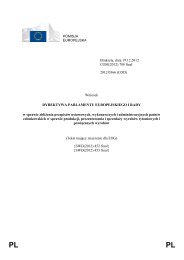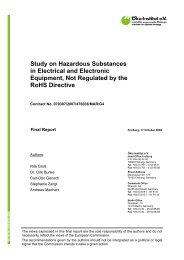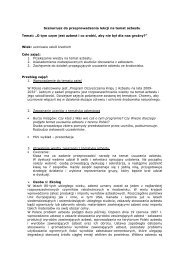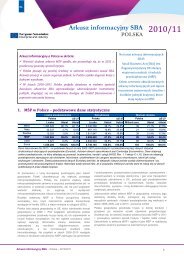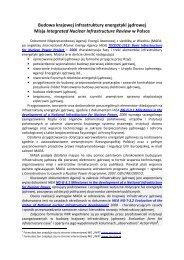Zielona księga w sprawie partnerstw publiczno-prywatnych i prawa ...
Zielona księga w sprawie partnerstw publiczno-prywatnych i prawa ...
Zielona księga w sprawie partnerstw publiczno-prywatnych i prawa ...
Create successful ePaper yourself
Turn your PDF publications into a flip-book with our unique Google optimized e-Paper software.
38. Such practices make it possible to sound out at an early stage the willingness<br />
of economic operators to invest in certain projects. They also encourage the m to<br />
develop or apply innovate technical solutions, suited to the particular needs of the<br />
contracting body.<br />
39. The fact that a public utility project originates in a private initiative does not<br />
change the nature of the contracts concluded between the contracting bodies and<br />
the economic operators. Where these contracts concern services covered by<br />
secondary legislation and are concluded for pecuniary interest, they must be<br />
designated either as a contract or a concession and adhere totheresulting award<br />
rules.<br />
40. It is there fore necessary to ensure that the procedures applied in this context<br />
do notend up depriving European economic operators of the rights to which the<br />
Community legislation on public contracts and concessions entitles the m. In<br />
particular, and at the very least, the Commission is of the view that all European<br />
operators must be guaranteed access to such projects, primarily through<br />
adeauateadvertising of the invitation to formulate a project. Subsequently, if the<br />
public authority wishes to implement a given project, it must organise a cali for<br />
competition addressed to all the economic operators who are potentially interested<br />
in developing the selected project, providing fuli guarantees of the impartiality of<br />
the selection process.<br />
41. To make the system attractive, the Member States have sometimes tried to<br />
provide certain incentives for first movers. The option of compensating the initiator<br />
of the project – for example, paying him for his initiative outside of the subsequent<br />
cali for competition procedure – has been used. The possibility was also eiwisaged<br />
of awarding the first mover certain advantages in the context of the cali for<br />
competition designed to develop the selected project. Such solutions merit close<br />
consideration, to ensure that these competitive advantages awarded to the project<br />
mover do not breach the equality of treatment of candidates.<br />
8. In your experience, are non-national operators guaranteed access to private<br />
initiative PPPs chemes? In particular, when contracting authorities issue an<br />
invitation to present an initiative, is there adequate advertising to in form all the<br />
interested operators? Is the selection procedure organised to implement the<br />
selected project genuinely competitive?<br />
9. In your view, what would be the best formula to ensure the development of<br />
private initiative PPPs in the European Union, while guaranteeing compliance with<br />
the principles of transparency, non-discrimination and equality of treatment?<br />
2.3. The phase following the selection of the private partner<br />
42. Community secondary legislation on public contracts and concessions mainly<br />
concerns the phase of award of a contract. Secondary legislation does not cover<br />
comprehensively the phase following selection of the private partner. However, and<br />
the principle of equality of treatment and the principle of transparency resulting<br />
48





